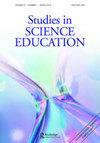后基因组时代的遗传学素养教学
IF 9.9
2区 教育学
Q1 EDUCATION & EDUCATIONAL RESEARCH
引用次数: 53
摘要
摘要遗传学和基因组学的研究进展迅速,因此跟上最新的发现和结论可能非常具有挑战性。与此同时,这些最新的发现和结论使得在科学和科学教育中对基因和遗传进行了必要的重新定义,超越了20世纪以基因为中心的观点。学校的遗传学教学应该在帮助学生实现遗传学素养方面发挥关键作用。然而,有关遗传学教育研究的文献报道了持续存在的困难和误解。我们首先考虑公众对遗传学的理解和态度。然后,我们回顾了最新的文献,并提出了在不同国家、年龄和背景的中学生中发现的最典型的概念。我们认为,直觉思维、教师、教科书和媒体等特定因素会影响学生对与遗传学相关的错误或过时思想的发展。最后,我们建议如何解决这些问题,以便中学遗传学教学实现在当前后基因组时代提高学生遗传学素养的目标。本文章由计算机程序翻译,如有差异,请以英文原文为准。
Teaching for genetics literacy in the post-genomic era
Abstract Research in genetics and genomics is advancing at a fast pace, and thus keeping up with the most recent findings and conclusions can be very challenging. At the same time these recent findings and conclusions have made necessary a reconceptualization of genes and heredity, both in science and in science education, beyond the mostly gene-centred view of the twentieth century. The teaching of genetics at schools should have a key role in helping students achieve genetics literacy. However, the literature on research in genetics education reports persistent difficulties and misunderstandings. We first consider the public understanding of and the attitudes towards genetics. Then, we review the most recent literature and present the most typical conceptions found among secondary students in various countries, ages and backgrounds. We argue that particular factors such as intuitive thinking, teachers, textbooks, and the media affect students’ development of erroneous or outdated ideas related to genetics. Finally, we suggest how these problems might be addressed in order for genetics teaching at the secondary level to fulfil the aim of contributing to students’ genetics literacy in the current post-genomic era.
求助全文
通过发布文献求助,成功后即可免费获取论文全文。
去求助
来源期刊

Studies in Science Education
EDUCATION, SCIENTIFIC DISCIPLINES-
CiteScore
15.30
自引率
2.00%
发文量
7
审稿时长
>12 weeks
期刊介绍:
The central aim of Studies in Science Education is to publish review articles of the highest quality which provide analytical syntheses of research into key topics and issues in science education. In addressing this aim, the Editor and Editorial Advisory Board, are guided by a commitment to:
maintaining and developing the highest standards of scholarship associated with the journal;
publishing articles from as wide a range of authors as possible, in relation both to professional background and country of origin;
publishing articles which serve both to consolidate and reflect upon existing fields of study and to promote new areas for research activity.
Studies in Science Education will be of interest to all those involved in science education including: science education researchers, doctoral and masters students; science teachers at elementary, high school and university levels; science education policy makers; science education curriculum developers and text book writers.
Articles featured in Studies in Science Education have been made available either following invitation from the Editor or through potential contributors offering pieces. Given the substantial nature of the review articles, the Editor is willing to give informal feedback on the suitability of proposals though all contributions, whether invited or not, are subject to full peer review. A limited number of books of special interest and concern to those involved in science education are normally reviewed in each volume.
 求助内容:
求助内容: 应助结果提醒方式:
应助结果提醒方式:


